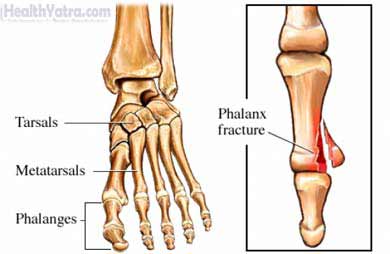Definition
A foot fracture is a break in any of the bones in the foot.
The foot is made up of 26 small bones. The tarsus is the seven bones that make up the hindfoot and the midfoot. The forefoot consists of the five metatarsals and the 14 phalanges. There are two phalanges in the big toe and three in each of the remaining toes.
A foot fracture can happen in any foot bone, but metatarsal fractures are the most common.

Causes
A foot fracture is caused by trauma to the bone. Trauma includes:
- Falls
- Blows or object falling on the foot
- Collisions
- Severe twists
When a bone is subjected to repeated stress over a long time, small cracks may form. These are called stress fractures. Certain bones (metatarsals and the talus) in the foot are at higher risk for this type of fracture.
Risk Factors
These factors increase your chance of developing a foot fracture. Tell your doctor if you have any of these risk factors:
- Advancing age
- Decreased muscle mass
- Osteoporosis
- Certain congenital bone conditions
- Abnormal or absent menstrual cycles
- Sudden change in activity or exercise program (such as, becoming a military recruit)
- High-impact or repetitive motion sports (such as, gymnastics, basketball, tennis, running)
Symptoms
Symptoms include:
- Pain, often severe
- Bruising and swelling in the injured area
- Numbness in toes or foot
- Decreased range of motion
- Inability to walk comfortably
- A lump or visible deformity over the fracture site
Diagnosis
The doctor will ask about your symptoms, physical activity, and how the injury occurred. The injured area will be examined and an x-ray of the foot will be done.
Treatment
Depending on how severe the injury is treatment will involve:
- Putting the pieces of the bone back in place, which may require anesthesia and/or surgery
- Keeping the pieces together while the bone heals itself
Nonsurgical Treatment
In a less severe foot fracture, the bones can be realigned without surgery. You may only need crutches and stiff-soled shoes to protect the fracture. Toes may be splinted together by taping to protect the injured toe.
A more serious fracture may require a splint or cast to hold the bones in place. You will need to use crutches to help you walk.
Surgery
In certain severe cases, you will need surgery to realign the bones. The doctor may use a small metal plate with screws, screws alone, or pins to hold the bones in place while healing takes place. A cast or splint will be placed on the foot after surgery. You will need to use crutches to help you walk. The doctor will order more x-rays while the bone heals. This is to make sure the bones have not shifted.
Exercises
When your doctor decides you are ready, start lower body range-of-motion and strengthening exercises. You may be referred to a physical therapist to assist you with these exercises. Do not return to sports until your foot is fully healed.
Healing Time
Metatarsal bones and the phalanges may heal in 3-6 weeks, but the tarsal bones will take 6-10 weeks to heal.
Prevention
To prevent foot fractures:
- Always wear well-fitting, supportive athletic shoes when doing physical activity.
- Alternate your physical activities.
- Wear proper shoes for each type of activity to protect your feet.
- Eat a diet rich in calcium and vitamin D.
- Do weight-bearing exercises to build strong bones.
- Build strong muscles to prevent falls and to stay active and agile.
